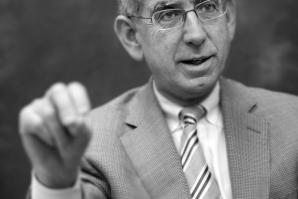Then:
The year was 1989. Comstock’s was in its infancy. Hometown boy Phil Angelides was featured in November, standing in the center of the historic Southern Pacific railroad station. Angelides had recently left politics, then launched his own land development company, River West, in 1986. The story, written by Comstock’s first editor, the late Jack Woodard, gained insight as to why the native son abandoned a promising career in politics for one in the equally risky business of land development.
With a degree from Harvard, some further grooming by the Coro Foundation and impeccable liberal credentials, he was a natural fit in the first administration of Gov. Jerry Brown. He landed an appointment in the Housing and Community Development Department, but before he could take it, he was tapped to run the successful Sacramento mayoral campaign of Phil Isenberg (who would go to serve in the state assembly as well).
Angelides went on to work for the Housing and Community Development agency from 1975 to 1979 and as chief of staff to the assembly majority leader Mike Roos from 1980 to 1983. From there, the logical next step would have been to find an elective seat to fill. Instead, Angelides switched to the private sector, first as president of his mentor Angelo Tsakopoulos’ AKT Development Corp. for a couple of years, then as owner of River West.
Regarding his switch to the private sector, the then 30-something president said, “I spent much of my career in the public sector working in the field of housing and land use. I cared about it a lot and began thinking it would be good to get out of the policy end and actually go into implementing those things that I’d been involved in.”
And he did just that. River West’s first major undertaking was as project manager of the 2,500-acre Laguna Creek development. At the time, it was Sacramento’s largest master-planned community. Angelides guided the project through the approval process and the formation of the state’s largest Mello-Roos Act community facilities district, with the authorization to sell $48 million in bonds.
Whether he was going to stay in the private sector or return to public service, Angelides insisted he intended to nurture his social concerns. “I always ask myself if I’m doing the most good I can possibly do, given the position I’m in,” he said.
In Between:
In 1991, Angelides officially returned to politics and was elected chairman of the California Democratic Party. During his 2-year tenure, he led a remarkable campaign that turned California from red to blue — electing two female senators for the first time in any state’s history and carrying the state for a Democratic presidential candidate for the first time in 28 years.
From 1999 to 2007, he served as California’s state treasurer. The Associated Press reported that he made “the sleepy treasurer’s office a policy powerhouse,” and The Sacramento Bee praised Angelides as “the most effective and dynamic state treasurer in a generation.”
In 2006, he was the Democratic nominee for the governor of California. The underdog to incumbent Arnold Schwarzenegger, he was easily defeated.
In 2009, Angelides was tapped by Speaker Pelosi and Senate Majority Leader Reid to serve as chairman of the Financial Crisis Inquiry Commission, a 10-member bipartisan panel created by federal law and charged with conducting the nation’s official inquiry into the causes of the financial and economic crisis. The commission presented its report to the President and congress in January 2011.
In June 2011, Angelides shared with Comstock’s his opinion that the crisis was avoidable and was caused by widespread regulation failures, dramatic breakdowns in corporate governance, excessive risk-taking by Wall Street, government leaders ill-prepared for crisis and systemic breaches in accountability and ethics. He also said it could happen again.
Now:
Following the completion of his work on the commission, Angelides officially returned to the private sector full time as president of Riverview Capital Investments in 2012. He quickly refocused his efforts on a 328-home development, McKinley Village, on 48 acres near McKinley Park and East Sacramento, two of Sacramento’s oldest neighborhoods. The site is adjacent to the Capital City Freeway and close to downtown Sacramento. It is also bordered by the American River and the Union Pacific Railroad tracks. If completed, it will become one of the region’s largest infill projects.
Angelides and company spent a year conducting a series of public hearings — many of which became very heated — on the project. Angelides noted that the latest proposal for this long-vacant parcel proposed far fewer homes and a community center. He added it will mirror the culture and architecture of its adjacent neighborhoods. He insisted that with the development’s proximity to downtown and planned access to commercial areas along Alhambra Boulevard, the property fits the concept of smart growth.
While he gained the support of the Sacramento Planning Commission, the Metro Chamber and many other groups, local neighborhood associations remained strongly divided on the subject. “Stop McVillage” lawn signs sprouted up all over East Sacramento. While some groups voiced adamant opposition to any type of development, others focused on the limited access points in and out of the enclosed property. Specifically, they wanted a railroad undercrossing at Alhambra. An undercrossing was deemed too expensive and a “deal breaker” by Angelides. The project includes planned entrances at 40th and 28th streets.
On Tuesday, April 29, Sacramento City Council voted 6-3 to approve the project. Leading the charge for council approval was Councilman Steve Hansen. “This is the best project we’re going to get on this site,” he said before the vote. Addressing the Alhambra access concern, Hansen said the city should work with other government agencies to explore funding options for a railroad undercrossing. Angelides has committed to contributing $2.2 million to the city for either building a bike and pedestrian tunnel or a vehicular tunnel at Alhambra Boulevard or donating about $2 million to the city for alternative transportation programs.
“There’s a leap of faith here,” Angelides said after the council meeting. “We’ve got a long way to go.”
A lawsuit challenging the findings of the city’s Environmental Impact Report on the development is pending.
Recommended For You

Love Thy Neighbor
Sacramentans love infill development – until it actually happens
Infill development is promoted as an antidote to suburban sprawl and environmental degradation and is championed by city planners, environmentalists and policy makers of all persuasions. But as local developers Paul Petrovich and Phil Angelides have long known, infill leads to fights over allegations of increased traffic or environmental hazards.

Free Fallin’
A former treasurer reflects on the Great Recession
Former California State Treasurer Phil Angelides was tapped in 2009 to chair the Financial Crisis Inquiry Commission, a 10-member commission that Congress tasked with determining the causes of the Great Recession.




Comments
I watched Mr. Angelides question Robert Rubin in his appearance before the FCIC. There were numerous intelligent persistent people on that commission, including of course Mr. Angelides. I've read massive amounts of commentary on the sub-prime mortage fraud, and numerous hearings and documentaries. Mr. Brewer's claim that "he had to prove beyond reasonable doubt there was criminal wrong doing..." was simply a lie. All Mr. Brewer had to do was bring a case against one of these rotten people and let the jury decide whether their actions were criminal.
I have read the RICO statutes, and I've read the DOJ guidelines for bringing a case under RICO, and it's clear that these statutes were created for the express purpose of charging people with racketeering where their conduct is sufficiently evasive that their actions, while criminal, may not fit more specific statutes.
I heard Robert Rubin mumble a response to one of the questioners before the FCIC where he repeatedly used the phrase "risk de minimis", telling the commission that in his opinion, that accurately characterized the view at the boardroom level as to the risks associated with these utterly fraudulent securities.
I don't know if Mr. Angelides is aware of this, but Robert Rubin resigned his post as Secretary of the Treasury in July of 1998, once he knew the "fix was in" repealing Glass-Steagall, and spent 6-months working for a non-profit charity, during which time he negotiated a deal with Citigroup for something like $12-million a year. When people refer to Bernie Madoff's crimes as the "worst Ponzi scheme in American history", it makes my blood boil. At least Bernie Madoff, once caught, had the dignity to admit to his crimes. As far as I'm concerned, if there's one guy who ought to be rooming with Bernie Madoff, it's Robert Rubin. One could argue that he spent his time as a 'civil-servant' setting up the single most critical enabling legislation that allowed the entire fraud to take place, and then joined the very bank in the most favorable position to get in on the ground floor of of a scheme that was already being test-marketed by Fannie Mae in the latter part of the 1990's.
I have nothing but admiration and respect for the job done by the FCIC. However, when Mr. Obama took office, instead of pursuing these billionaire racketeers (one of whom, Mr. Rubin, was listed as one of Obama's top advisers), he arranged for the Fed to print up $1.2-Trillion and use it to take these toxic assets off the hands of Citigroup, Goldman Sachs, et.al. I'm six months older than Mr. Angelides. I never imagined I would see my country and it's government fall to a level of corruption such as we see today.
The only person with the professional experience I've seen who understands what went on, and understands what should have been done by the DOJ is Elliot Spitzer. I'm at a loss as to what ordinary citizens can do to clean out our government of these corrupt operators. But I did want Mr. Angelides to know his and his colleagues efforts on the FCIC were noticed and appreciated.
Ted Thomas
Portland, Oregon